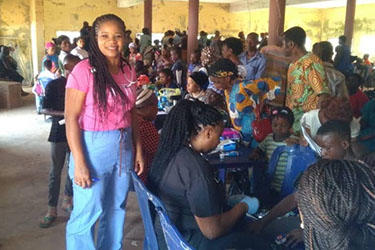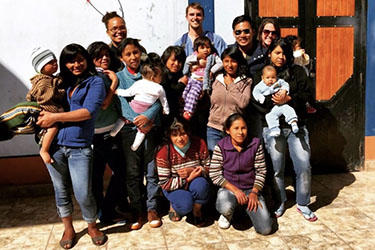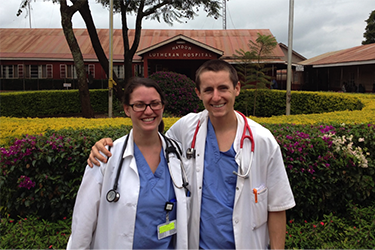Chioma Eze, MD, MPH, Resident Class of 2021

Leading up to my second year as a Family Medicine Resident, I had this wild idea to take what I had learned so far to my home country and also see practice of medicine there from my new "outside" eyes. This prompted a quick conversation with Global Health Faculty Dr Turkson. With her blessing, I approached my program director who set the ball rolling. This was the beginning of my life affirming experience of going back to my Home country armed with what I knew from residency training thus far.
My rotation started with my presentation on Physician well care to the Community Medicine residents. An eye-opening orientation to Medicine without "frills" shocked me into reality in Healthcare. History taking and physical exam became even more emphasized as my best diagnostic tools. The curriculum included Pediatrics care, Immunization clinic, Community health, Surgery, Women's health, Geriatrics care(mostly home visits) and Adult Primary care. I participated in 3 mission projects. One was my exit project, which required my planning and executing the mission. Lesson learned include the fact that physicians in developing countries are miracle workers- they do so much good with so little resources. Triaging complaints of patients in itself is emphasized and very useful especially when resources are limited. Throughout my rotation, I stay closely in touch with the Global Health gurus, Drs. Turkson and Conway. I credit them as my anchor for the emotionally challenging days especially following a Pediatric malnutrition patient whose family couldn't stay to get him admitted.
I came back from the trip in gratitude for all that I experienced including patients who got on public transportation for 4 hours to be seen, who couldn't afford to return for follow up or the doctors who gave money to their patients to pay for medications. The rest of my residency was shaped by this experience. As an attending, my vision to do more for my patients and my community at large is a process that needs cultivating but the seed was already sown by my Global health rotation.
Michael Dressing, Class of 2015

The Global Health Program was one of the main reasons that I chose to attend medical school at Wright State University. I had been involved with some domestic and international mission trips in high school and college, but wanted to help and see the world from a medical perspective as well. That experience came quickly through meetings and lectures in my first year of medical school, but more importantly through a medical mission trip to Jamaica with 12 of my classmates and two attending physicians during the summer after the first year finished. Not only was it a good way to practice physical exam skills and see diseases and conditions that weren't seen in the United States, but it was an exposure to a totally different culture. Patients that we saw were thankful for Tylenol and band-aids, things that we take for granted. Banana farmers with severe degenerative arthritis in their hands presented to our clinic barely able to grip a pen. My views on medicine, as well as happiness, success, and wealth were totally transformed from these encounters. The faculty did a fantastic job prior to the trip, as well as in Jamaica to prepare us as much as they could for what we would experience, but seeing it in real life was the true learning experience.
As I continued through medical school, I became more involved with the Global Health Initiative, taking on the role of President one year. To work with the faculty and help with education and planning of different medical mission trips was a different level of experience. I was fortunate enough to connect with the leader of Timmy Global Health, as well as attend a conference at University of California Berkeley for Doctors for Global Health in the next few years. I felt like the experience I had gained from my prior trip, as well as leadership roles that I took at Wright State provided a solid foundation that I could expand on in the future.
During my fourth year of medical school, I went with three others to Cusco, Peru for one month. While there, we volunteered in a general medical clinic, and worked with a shelter for teenage mothers and their children. Wright State and the Global Health Program helped to facilitate our trip and made it possible, but the four of us planned the logistics on our own. This was a totally unique experience compared to the prior one to Jamaica, but equally as rewarding. Two years later I was selected to go on a trip during residency to Panama, and I felt like the experiences that I had during medical school prepared me well. I plan on continuing to involve myself in global health, especially through mission trips in the future. And more importantly, I enjoy sharing my experiences with others to hopefully inspire another class of leaders to feel the same way.
Kyle Davis and Shaina Hecht, Class of 2014

Wright State's commitment to high quality care in the international realm motivated us to undertake two trips during our training. After completing our infectious disease course at the end of our first year, we traveled to Lima, Peru with about 10 other Boonshoft students. We then traveled together to Tanzania in our fourth year where we had the opportunity to develop our clinical reasoning on busy pediatric and adult wards. We continue to remain involved in global health experiences. We traveled to Laos for medical work during residency and we have continued to remain involved in global health education during fellowship. Our experience at Wright State provided the motivation and support to engage in the global health care and we look forward to continuing to give back during our future careers. The reason we continue to engage in global opportunities is because of our time in the Global Health Scholars Program at WSU.